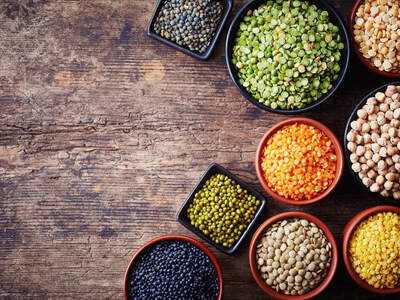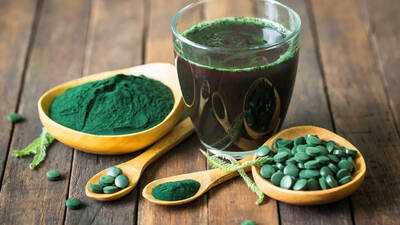Protein is essential for many body processes. It is the building block for muscles, bones, cartilage, skin, and blood. Protein also plays a crucial role in the production of enzymes, hormones, and antibodies. It also helps in cell repair, growth, and various metabolic processes. You are supposed to get 10% of your daily calories from protein. But does that necessarily mean consuming a lot of meat every day? Higher amount of meat intake is also linked to inflammation, dementia, increased risk of cardiovascular diseases, and even cancer. Also, what about vegans and vegetarians? How do they get their protein? Dr. Steven Gundry, MD, a former cardiac surgeon and bestselling author, has recently shared some of the high-protein sources that involve no animal meat. Take a look.
Lentils

Lentils are of the best sources of plant-based protein you can get. One cup (198g) of cooked lentils contains 18 g of protein. It is also low in calories and is rich in resistant starch and prebiotic fiber, which is good for the gut microbiome. Your gut is going to thank you because a single cup of lentils will give you half of your recommended daily fiber. “Soak or pressure-cook lentils to reduce lectins, which can impact or slow down nutrient absorption. You can add lentils to soups, stews, or homemade veggie burgers,” the cardiac surgeon told CNBC.
Flaxseeds

This is perhaps the most underrated protein source. They are an excellent source of protein, omega-3s, and lignans, which have hormone-balancing benefits. The doctor recommends consuming ground flaxseeds because the whole ones are difficult to digest, and the bioavailability of their beneficial compounds suffers. The doctor revealed that he keeps a bag of organic whole flax in the refrigerator and grinds it as needed to ensure freshness. You can add them to smoothies, sprinkle them on salads, or oats.
Barù nuts

Another good protein source, Dr. Gundry suggests, is Barù nuts. They are native to Brazil and are loaded with protein. It has more protein than any other nut. Also rich in antioxidants and fiber, these nuts have an earthy flavour. They are available in grocery stores and online. The doctor reveals that he munches on a handful of nuts daily. “They taste like a cross between peanuts and almonds.”
Spirulina

Yes, spirulina, the blue-green algae, is a protein-dense food. About 70% of it is protein. Also rich in iron, B vitamins, and a powerful antioxidant called phycocyanin, spirulina can boost brain and immune function. “Try adding spirulina to your smoothies or juices. You can also substitute it with chlorella, another nutrient-rich alga, in powder or tablet form,” he suggests.
Video
Sorghum
If you are sick of eating quinoa or couscous, try sorghum. This ancient grain is an excellent source of protein. One cup of sorghum has about 21 g of protein, which is about twice what quinoa can provide! You can also grind it into flour and use it to bake, and also make pasta.
Lentils
Lentils are of the best sources of plant-based protein you can get. One cup (198g) of cooked lentils contains 18 g of protein. It is also low in calories and is rich in resistant starch and prebiotic fiber, which is good for the gut microbiome. Your gut is going to thank you because a single cup of lentils will give you half of your recommended daily fiber. “Soak or pressure-cook lentils to reduce lectins, which can impact or slow down nutrient absorption. You can add lentils to soups, stews, or homemade veggie burgers,” the cardiac surgeon told CNBC.
Flaxseeds

This is perhaps the most underrated protein source. They are an excellent source of protein, omega-3s, and lignans, which have hormone-balancing benefits. The doctor recommends consuming ground flaxseeds because the whole ones are difficult to digest, and the bioavailability of their beneficial compounds suffers. The doctor revealed that he keeps a bag of organic whole flax in the refrigerator and grinds it as needed to ensure freshness. You can add them to smoothies, sprinkle them on salads, or oats.
Barù nuts

Another good protein source, Dr. Gundry suggests, is Barù nuts. They are native to Brazil and are loaded with protein. It has more protein than any other nut. Also rich in antioxidants and fiber, these nuts have an earthy flavour. They are available in grocery stores and online. The doctor reveals that he munches on a handful of nuts daily. “They taste like a cross between peanuts and almonds.”
Spirulina
Yes, spirulina, the blue-green algae, is a protein-dense food. About 70% of it is protein. Also rich in iron, B vitamins, and a powerful antioxidant called phycocyanin, spirulina can boost brain and immune function. “Try adding spirulina to your smoothies or juices. You can also substitute it with chlorella, another nutrient-rich alga, in powder or tablet form,” he suggests.
Video
Sorghum
If you are sick of eating quinoa or couscous, try sorghum. This ancient grain is an excellent source of protein. One cup of sorghum has about 21 g of protein, which is about twice what quinoa can provide! You can also grind it into flour and use it to bake, and also make pasta.
You may also like

Stop theatrics, pass Assembly resolution on J&K statehood: Sajad Lone tells CM Omar

Delhi L-G VK Saxena asks people to serve nation with greater commitment

Head coach Hurzeler 'very confident' on Baleba's future at Brighton

Thomas Frank rules out Tottenham player vs Burnley and hints at changes

ED raids Vuenow Group in multi-thousand crore 'cloud particle scam'






